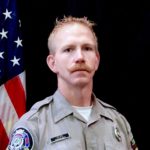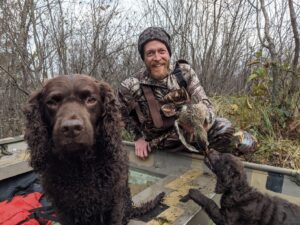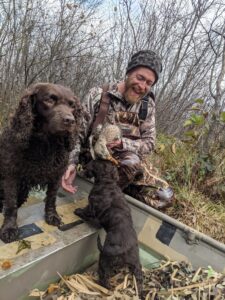An article from WWA’s Words From The Wardens.
This article originally appeared in Wisconsin Waterfowl Association’s February, 2022 eNewsletter.
 By DNR Conservation Warden Tim Otto
By DNR Conservation Warden Tim Otto
I am Tim Otto, the conservation warden for the Wisconsin Department of Natural Resources (DNR) in Rhinelander.
One of the most satisfying elements of my career is my involvement with new hunter recruitment programs. You may remember my March 2020 column where I explained my experiences before the pandemic hit.
I’ve taught Hunter Education, Trapper Education, youth field days and started a Learn to Hunt for Food course, specifically for upland birds. The DNR has an active group of staff involved with hunter recruitment, retention and reactivation – known as R3 in hunting circles.
I’m back to tell you how things went during these past two years. In the winter of 2020, I had my third iteration of the Learn to Hunt for Food planned with several new organizational and structural changes. I had pheasants ordered, range days scheduled, wing-shooting coaches scheduled, mentors lined-up and about 10 adult students. There was excitement in the core group of mentors that this was going to be a great event. Then, Covid-19 hit, throwing a wrench into my plan.
During the pandemic, people have been paying closer attention to where their food comes from. The prices of beef, pork, chicken and other meats have risen drastically, causing people to look for cheaper ways to get their protein. This factor, in addition to people wanting meat raised in a sustainable way, has driven an increased interest in hunting and fishing.

Harry’s first duck with Aldo, who made the retrieve, and Frannie, my American Water Spaniel pup. Weeks later, Aldo bought his own spaniel pup. Photos by DNR Warden Tim Otto
SHARE YOUR HUNTING EXPERTISE
Recruiting new hunters during a pandemic has forced us to change the way we do things. Instead of groups in indoor spaces, recruitment takes place one-on-one.
Rather than waiting to help with a class, please consider introducing hunting to someone you already know. How about someone in your family, your social circle or at your work site? You may know someone who is interested in hunting, but who has no one to help them learn the basics, much less the intricacies involved.
Those of us who are lifelong hunters often take the skills we’ve acquired for granted. A new hunter probably doesn’t know how to read a plat map, contours or interpret aerial imagery.
 PUTTING WORDS INTO ACTION
PUTTING WORDS INTO ACTION
Once you’ve started talking to a new hunter, determine their skill level and equipment needs. Some people may not have any shotgun experience or own a shotgun.
Take time with the new hunter at a trap range so they have a chance to shoot and learn basic safe gun handling skills. After they get some confidence, a trip through the local sporting clays course may be a good introduction to what they can expect in hunting situations.
When taking a new hunter waterfowl hunting, recognize that they may not share your level of dedication. Insisting a new hunter wake well before dawn to drive two hours in a car, followed by setting out decoys in the dark to stand in waist-deep water with hip boots, may not be their idea of a good time.
Also, if trying to get them to become self-sufficient and able to hunt on their own, taking them to hunt in an expensive surface drive boat with the best flip-top blind may lead them to think that waterfowl hunting is too expensive of a hobby.
With new hunters, we discuss the reasons that I hunt and what I find exciting. For example, although I enjoy telling tales of 10-minute greenhead limits, I also like to point out how excited I get sipping my coffee and listening to the jet engines of wood ducks buzz over my head before shooting hours. I emphasize that they can hunt however they want and with minimal equipment. I give suggestions on where and how they can jump shoot on foot with hip boots.
New hunters don’t necessarily have their own spots and you may need to be willing to provide them with a specific location so they can get their footing in this new hobby. With that in mind, I do usually work in a conversation about the value of an experienced waterfowler sharing their best spots.
The hunting community needs mentors to pass on their knowledge. Spring is a great time to start the process of exposing someone to shotguns, dogs, the marsh and other elements of hunting.
To be a mentor, you don’t need to be an expert. Please consider taking a non-hunter hunting. It’s fun and rewarding!
